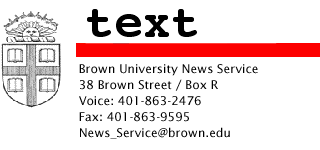Distributed March 7, 2003
For Immediate Release
News Service Contact: Mark Nickel
President Ruth J. Simmons
The success of colleges and universities is crucial to R.I. cities and towns
As part of his budget, presented Wednesday evening, March 5, 2003, Gov. Donald Carcieri proposed that cities and towns be allowed to tax nonprofit private colleges and universities, eliminating a tax-exempt status that dates to the 18th century. Brown University President Ruth J. Simmons has issued the following statement in response.
Governor Carcieri has proposed that cities and towns be permitted to tax
nonprofit private colleges and universities that have been tax-exempt since
before the birth of the American Republic. In my judgment, such a
fundamental change in the relationship between institutions of higher learning
and their host municipalities would be very poor economic and social
policy. Such a change could make it impossible for colleges and universities
to work in a collaborative way with those municipalities and with the
State to make meaningful progress on the economic and other challenges that face
us all.
By using tax dollars to subsidize their public universities, state governments affirm the social and economic advantages of higher education. State support of public education is an enlightened policy of longstanding that contributes directly to the public good.
Private colleges and universities serve the same higher purpose but do not rely on state appropriations to subsidize their capital facilities and operations. Brown and other independent institutions must raise private donated capital for that purpose. Our ability to raise that capital is significantly related to our status as tax-exempt institutions.
Our donors, whether individuals, corporations or foundations, know their philanthropy will be used entirely for the academic and scholarly activities they wish to support. In fact, Brown’s endowment is rightly understood as an historical record of donor intentions, which are stringently protected by Rhode Island law. If a donor has provided specific endowment funding for a lecture series, it would be a breach of faith to use it for another purpose. More than three-quarters of Brown’s endowment is restricted as to purpose.
Brown and its sister institutions raise money from all over the world to support their education and research mission. Brown depends on these funds to support approximately 22 percent of its operations annually, assisting in the operation of everything from police and security to library services and student scholarships.
Our success in that endeavor is of direct and significant benefit to the City of Providence and the State of Rhode Island. Higher education is the third largest sector in the Rhode Island economy; Brown alone is the second largest private employer in Providence. A significant contributor to our community, city and state, Brown generates more than $400 million annually – the equivalent of 7,000 jobs. Further, as the state's only Medical School, Brown plays a unique role in the delivery and improvement of health services, helping to make Providence a leading center of healthcare and research.
Brown is committed to developing more and better ways to work together to ensure economic development in the City and the State based on our own plans for academic enrichment and our long history of working collaboratively with the broader community.
To continue that productive partnership, we must thrive as a center of teaching and learning, as a leader in educating the future work force, and as a major enterprise in our own right. Brown’s preeminence as a research university contributes to Rhode Island and to Providence by attracting federal, corporate and foundation funding, by enriching the learning environment of Rhode Island, by attracting new residents to the state, and in some cases by leading directly to the creation of new businesses.
Clearly, any effort to change the fundamental relationship between the City and the University by permitting the City to impose a tax on heretofore tax-exempt institutions would jeopardize our ability to accomplish much of this. In fact, this effort would be counterproductive to a collaborative approach to addressing the significant economic and other challenges facing the State and the City of Providence. The resurrection of virtual walls between the University and the community – walls we have endeavored so assiduously to break down during the past two decades – moves us decidedly in the wrong direction.
I hope that Rhode Island chooses to encourage its institutions of higher learning to grow and thrive, fulfilling their mission of service to society through teaching, the creation of knowledge, and the promotion of economic development. Brown wants to continue helping to provide a better future for the people of Rhode Island, and in particular for the people of Providence, the city with which we have proudly shared nearly 250 years of history.
######





